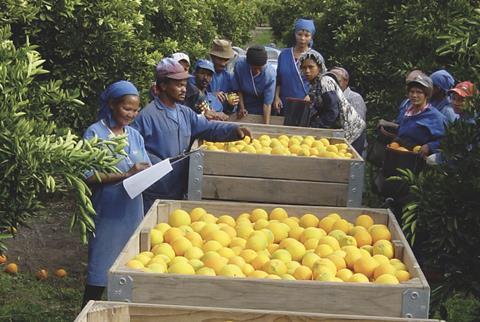CGA warns that this year’s lower harvest is merely a blip in the country’s citrus export drive
South Africa’s 2024 citrus export season has concluded – with the final packed volume being slightly short of last year’s export figure. The small decline is still seen as a strong performance for the sector, given the truly uniquely demanding circumstances growers faced.
This year, the Southern African citrus growers packed 164.5mn 15kg cartons for delivery to global markets. While this is 600,000 cartons less than last year. The initial estimate for total exports was 181.7mn 15kg cartons. The final figure is therefore 9 per cent less than the original estimate.
The CGA has previously outlined the main reasons for this shortfall: “It is important to note that even though export numbers have declined slightly from 2023, the amount of citrus being produced in South Africa continues to increase,” it stated.
“It is estimated that in total 10.1mn cartons were diverted to local juicing and lost to weather events. Considering this, the CGA is confident that, if all role-players come together, our long-term growth target of exporting 260mn cartons.”
Port efficiency remained a serious concern for the citrus industry during the past season. “The lower-than-expected citrus export volumes reduced peak volumes at ports dramatically, which eased pressure on the container terminals. However, all indications are that this is just a temporary reprieve in pressure on our underperforming ports and will not last,” the CGA noted.
With volumes forecast expected to increase over the next few seasons, citrus exports – along with the wider economy – will suffer unless ports improve their game.
Mitchell Brooke, the CGA’s logistics development manager, commented: “The CGA is of the strong opinion that more public-private partnerships are needed urgently. Although the partnership between Transnet and International Container Terminal Services Inc. (ICTSI) on Durban Pier 2 has been delayed because of legal matters, there must be a renewed urgency to improve container terminals and unlock the economic potential of our ports”.
The CGA added that it should also be noted that the European Union’s “unscientific and unnecessarily restrictive trade measures on Citrus Black Spot (CBS) and False Coddling Moth (FCM)” continued to have a dampening effect on exports.
“These measures still represent an entire opportunity cost for local growers of R3.7bn. South Africa’s historic cases against these measures at the World Trade Organisation are making progress and are set to enter the next phase in the dispute process in mid-December,” the CGA noted.


